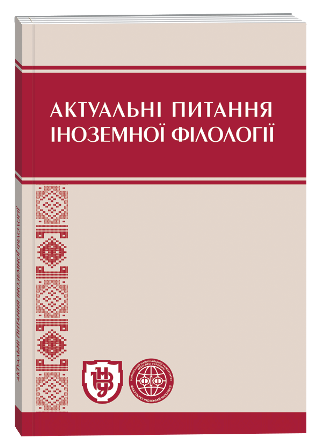FEATURES OF THE FORMATION OF THE ENGLISH COMPUTER VOCABULARY
Keywords:
neologism, computer vocabulary, affixation, composition, abbreviation, computer termsAbstract
The article summarizes the current trends in the formation of computer vocabulary. The main ways of forming computer vocabulary are analyzed, as well as the methods of forming computer terminology. The extralinguistic factor, namely the information revolution (the development and implementation of the latest information technologies) plays a leading role in changes in the computer lexicon corpus. Depending on the sphere of use, computer vocabulary can be divided into several groups: commonly used computer vocabulary; Internet users vocabulary; professional vocabulary of programmers; vocabulary of users of computer programs; computer games vocabulary. Word-building processes actively branch out computer vocabulary, as evidenced by the presence of a sufficiently large number of singular words. The most active at the present stage is the use of the suffix method of word formation. Computer vocabulary is distributed both in the method of substantization and verbalization. Some words that are part of computer vocabulary are formed by telescopic word formation, in which only parts of the foundations of several words appear in a word. There are several types of speech compression in relation to computer vocabulary: truncation of the basis, collection of the basis, abbreviation, acronym. English computer terms are characterized by different wordformation structure, namely, the available abbreviations, compound words, derivation. The development of the “virtual” economy, the involvement of as many people as possible in the use of the international computer network has led to the emergence of qualitatively new (digital) media that operate exclusively through the Internet. This process led to the emergence of a reflection in the language of such new realities as electronic journals. This group of neologisms was created by telescoping - fusion of permanent computer morphemes with elements that were isolated from words.
References
Andrusiak, I. V. 2003. “Anhliiski neolohizmy kintsia XX stolittia yak skladova movnoi kartyny svitu”. PhD diss., Kyiv.
Antrushyna, N. B., Afanaseva, O. V., Morozova N. N. 1999. Leksykolohyia anhlyiskoho yazyka. Moskva: Drofa.
Bushkova, V. V. 2007. Porivnialna leksykolohiia anhliiskoi ta ukrainskoi mov.
19 Cherednychenko V. O. 2005. Innovatsiina frazeolohichna verbalizatsiia v anhliiskii movi (linhvokohnityvnyi ta sotsiolinhvistychnyi parametry). Zaporizhzhia : Zaporizkyi natsionalnyi un-t.
20 Dillard J. L. 1992. A History of American English. Harlow: Longman.
Elyseeva V. V. 2003. Leksykolohyia anhlyiskoho yazyka. Uchebnyk, SPb: SPbHU.
Emirsuinova H. I. 2003. “Leksykon suchasnoho feminizmu (na materiali anhliiskoi movy)”. PhD diss., Zaporizhzhia.
Gak V. H. 2004. Besedy o frantsuzskom slove. Iz sravnytelnoi leksykolohyy frantsuzskoho y russkoho yazykov. Moskva: Editorial.
Hubert A. 2001. “Data-base Marketing”. US News and World Report 20:27–32.
Kveselevych D. I., Sasina V. P. 2003. Praktykum z leksykolohii suchasnoi anhliiskoi movy. Vinnytsia: Nova knyha.
Kotelova N. Z. 1987. Pervyi opyt leksikohrafycheskoho opisanyia russkikh neolohizmov. Leningrad: Nauka 5–26.
Kocharian Yu. H. 2007. “Abbrevyatsyia kak lynhvystycheskyi fenomen: na prymere anhlyiskoi voennoi leksyky”. Vestnyk Moskovskoho unyversyteta 7:26–38.
Mostovyi M. I. 1993. Leksykolohiia anhliiskoi movy. Kharkiv: Osnova.
Verba L. H. 2003. Porivnialna leksykolohiia anhliiskoi ta ukrainskoi mov. Vinnytsia: Nova knyha.
Wallis G. 2000. “Year 2000 Survey”. US News and World Report 39–43.
Yenikieieva S. M. 1999. Formuvannia ta funktsionuvannia novykh slovotvorchykh elementiv anhliiskoi movy. Zaporizhzhia: Zaporizkyi derzh. Un-t.
Zabotkyna V. Y. 1989. Novaia leksyka sovremennoho anhlyiskoho yazyka. Moskva: Vysshaia shkola.
Zatsnyi Yu. A. 1997. Neolohizmy anhliiskoi movy 80-90 rokiv XX stolittia. Zaporizhzhia: RA Tandem-U.
Zatsnyi Yu. A. 1999. Rozvytok slovnykovoho skladu suchasnoi anhliiskoi movy v 80-ti – 90-ti roky XX stolittia. Kyiv: Kyivskyi universytet imeni Tarasa Shevchenka.
Zatsnyi Yu. A., Pakhomova T. O. 2001. Mova i suspilstvo: zbahachennia slovnykovoho skladu suchasnoi anhliiskoi movy, Zaporizhzhia: Vydavnytstvo ZDU.
Zatsnyi Yu. A. 2008. Slovnyk neolohizmiv. Innovatsii u slovnykovomu skladi anhliiskoi movy pochatku XXI stolittia: anhlo-ukrainskyi. Vinnytsia: Nova Knyha.
Zbirnyk materialiv III Mizhvuzivskoi studentskoi naukovo-praktychnoi konferentsii “Movna kultura fakhivtsia u konteksti suchasnosti”. 2010. Donetsk: DonNTU 56–57.







